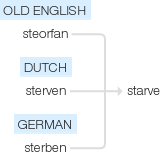Starve
Old English steorfan ‘to die’, of Germanic origin, probably from a base meaning ‘be rigid’ (compare with stare); related to Dutch sterven and German sterben .
wiktionary
From Middle English sterven, from Old English steorfan(“to die”), from Proto-Germanic *sterbaną(“to become stiff, die”), from Proto-Indo-European *(s)terp-(“to lose strength, become numb, be motionless”); or from Proto-Indo-European *sterbʰ-(“to become stiff”), from *ster-(“stiff”); or a conflation of the aforementioned. Cognate with Scots sterve(“to die, perish”), Saterland Frisian stjerwa(“to die”), West Frisian stjerre(“to die”), Dutch sterven(“to die”), German Low German starven(“to die”), German sterben(“to die”), Icelandic stirfinn(“peevish, froward”), Albanian shterp(“sterile, unproductive, barren land”).
etymonline
starve (v.)
Old English steorfan "to die" (past tense stearf, past participle storfen), literally "become stiff," from Proto-Germanic *sterbanan "be stiff, starve" (source also of Old Frisian sterva, Old Saxon sterban, Dutch sterven, Old High German sterban "to die," Old Norse stjarfi "tetanus"), from extended form of PIE root *ster- (1) "stiff."
The conjugation became weak in English by 16c. The sense narrowed to "die of cold" (14c.); transitive meaning "to kill with hunger" is first recorded 1520s (earlier to starve of hunger, early 12c.). Intransitive sense of "to die of hunger" dates from 1570s. German cognate sterben retains the original sense of the word, but the English has come so far from its origins that starve to death (1910) is now common.
